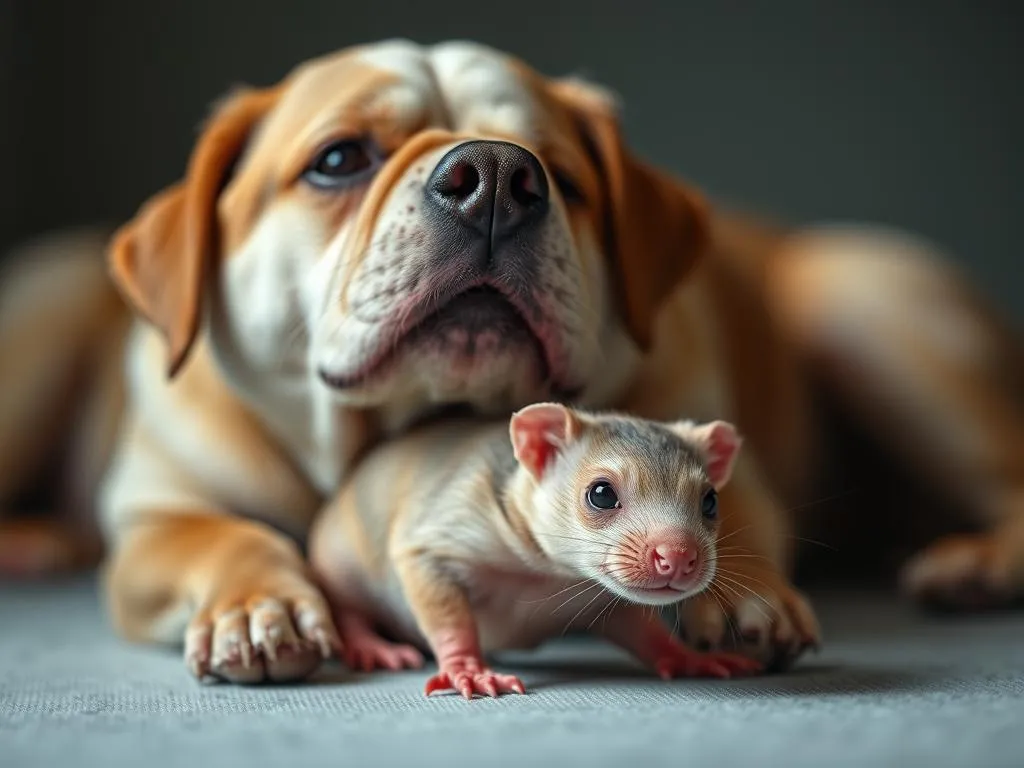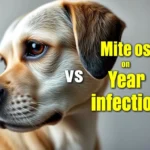
Introduction
Rodent ulcers in dogs, also known as eosinophilic granulomas, are common yet often misunderstood skin conditions that can significantly affect a dog’s quality of life. These lesions appear as raised, ulcerated areas, typically located on the lips or around the mouth. Understanding the significance of rodent ulcers is crucial for dog owners, as these can be indicators of underlying health issues, including allergies or autoimmune diseases. Consulting a veterinarian for accurate diagnosis and treatment is vital to ensure your dog receives the care it needs. In this article, we will explore rodent ulcers in detail, including their causes, symptoms, treatment options, and preventive measures.
Understanding Rodent Ulcers
What Are Rodent Ulcers?
Rodent ulcers are characterized by raised, swollen lesions that may ooze or bleed, giving them a rodent-like appearance, hence the name. These ulcers are commonly found on the upper lip, but they can also appear in other areas of the body. The term “eosinophilic granuloma” refers to the presence of eosinophils, a type of white blood cell that often increases in response to allergens, infections, or inflammatory conditions. While they are not cancerous, these ulcers can cause discomfort and pain to affected dogs, making it essential for pet owners to recognize and address them promptly.
Causes of Rodent Ulcers
The exact cause of rodent ulcers in dogs is not fully understood, but several underlying factors may contribute to their development:
- Allergies: Environmental allergens such as pollen, dust mites, or certain foods can trigger an adverse reaction in some dogs, leading to the formation of these ulcers.
- Autoimmune Diseases: Conditions where the immune system mistakenly attacks the body, such as pemphigus, can result in skin lesions, including rodent ulcers.
- Bacterial Infections: Secondary infections may worsen the condition, especially if the dog has been licking or scratching the affected area.
- Environmental Irritants: Exposure to irritants like certain shampoos, cleaning products, or insect bites can initiate or exacerbate the condition.
Who Is Affected?
Rodent ulcers can occur in any dog, but certain breeds appear to be more susceptible. Breeds such as the American Bulldog, Boxer, Labrador Retriever, and Bull Terrier often show a higher incidence of these lesions. Age and gender predispositions also exist, with young to middle-aged dogs and females being more commonly affected. However, it is crucial to note that any dog can develop rodent ulcers, regardless of breed or age.
Symptoms and Diagnosis
Recognizing Symptoms
The symptoms of rodent ulcers can vary, but there are some common signs to watch for:
- Raised, ulcerated lesions on the lips or mouth
- Swelling around the affected area
- Pain or discomfort, leading to changes in eating habits
- Excessive licking or scratching at the sores
- Foul odor from the mouth if secondary infections are present
Differentiating between rodent ulcers and other skin conditions, such as hot spots or tumors, is essential for effective treatment. If you notice any of these symptoms in your dog, it is crucial to consult with a veterinarian for a proper diagnosis.
Diagnostic Procedures
Veterinary examination techniques are vital for diagnosing rodent ulcers. A thorough physical examination will typically be the first step. Your veterinarian may also recommend:
- Skin Biopsy: Taking a small sample of the ulcerated tissue can help determine the nature of the lesions and rule out more serious conditions.
- Laboratory Tests: Blood tests may be performed to check for underlying allergies or autoimmune diseases.
- Imaging Techniques: In some cases, X-rays or ultrasounds might be necessary to examine deeper tissue or rule out other health issues.
Treatment Options
Conventional Treatment
For rodent ulcers, conventional treatment often includes medications to help control symptoms and address underlying causes:
- Corticosteroids: These anti-inflammatory medications are commonly prescribed to reduce swelling and discomfort associated with rodent ulcers. Your veterinarian will determine the appropriate dosage based on your dog’s condition.
- Antibiotics: If your dog has developed a secondary bacterial infection due to excessive licking or scratching, antibiotics may be necessary to clear the infection.
- Other Medications: Depending on the underlying cause, additional medications such as antihistamines or immune modulators may be recommended.
Alternative and Complementary Therapies
Many pet owners seek natural remedies and holistic approaches alongside conventional treatment. Some options to consider include:
- Diet Modification: Switching to a hypoallergenic diet or eliminating potential allergens can significantly improve your dog’s condition if allergies contribute to the ulcers.
- Natural Supplements: Omega-3 fatty acids and other anti-inflammatory supplements may help reduce inflammation and promote healing.
- Topical Treatments: Certain natural ointments or creams can soothe the affected area and aid in healing, though these should always be used under veterinary guidance.
Surgical Options
In rare cases, surgery may be necessary for treating rodent ulcers. If the ulcers are extensive, recurrent, or do not respond to other treatments, surgical intervention may help remove the affected tissue. Post-surgery, your veterinarian will provide specific recovery instructions and monitor your dog for any complications.
Prevention Strategies
Identifying and Avoiding Triggers
Preventing rodent ulcers involves identifying and avoiding allergens or irritants that could trigger their development. Here are some tips:
- Monitor Diet: Keep track of your dog’s diet and any changes that coincide with the appearance of ulcers. Consider a food trial to identify potential food allergies.
- Limit Exposure to Allergens: If your dog is allergic to pollen, dust, or other environmental factors, try to minimize exposure during peak allergy seasons.
- Maintain Cleanliness: Regularly clean your dog’s living environment to reduce exposure to dust and irritants.
Regular Veterinary Check-Ups
Routine veterinary check-ups are essential for maintaining your dog’s overall health. Regular visits can help catch issues early, including rodent ulcers, and allow for timely intervention. Your veterinarian can guide you on the best preventive measures based on your dog’s individual needs.
Living with Rodent Ulcers
Caring for Your Dog at Home
If your dog is diagnosed with rodent ulcers, there are several ways you can provide care at home:
- Wound Care: Keep the affected area clean and dry, following your veterinarian’s instructions on cleaning and dressing the ulcers.
- Monitor Symptoms: Watch for any changes in your dog’s condition, such as increased swelling, discharge, or signs of pain, and report these to your vet.
Emotional Support for Your Dog
Dealing with health issues can be stressful for dogs. Here are some techniques to provide comfort and emotional support:
- Create a Calm Environment: Ensure your dog has a quiet, comfortable space to rest, away from loud noises or stressful situations.
- Spend Quality Time: Engage in gentle activities that your dog enjoys, such as short walks or playtime, helping to alleviate stress and anxiety.
When to Seek Veterinary Help
Signs That Require Immediate Attention
If your dog exhibits any of the following severe symptoms, it is essential to seek urgent veterinary care:
- Rapidly worsening lesions or increased swelling
- Severe pain or signs of distress
- Fever or lethargy
- Difficulty eating or drinking due to pain
Building a Relationship with Your Vet
Establishing a good relationship with your veterinarian is crucial for managing your dog’s health. Communicate openly about your concerns, and don’t hesitate to ask questions regarding your dog’s treatment plan. Regular follow-up care and an open dialogue can help ensure the best possible outcome for your dog.
Conclusion
Understanding rodent ulcers in dogs is vital for every pet owner. These lesions can be uncomfortable for dogs and may indicate more serious underlying health issues. Early diagnosis and effective treatment are critical to preventing further complications. If you suspect your dog may have rodent ulcers, seek veterinary advice promptly. By staying informed and proactive, you can maintain the health and well-being of your beloved companion.









